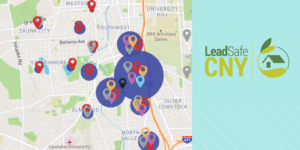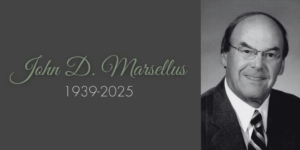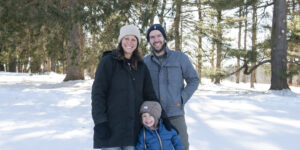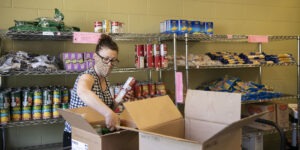At Syracuse’s Fowler High School, an overwhelming majority of the student body is considered to be living below the poverty line. In 2018, the school saw less than half of its senior class graduate. The annual income for someone without a high school diploma is on average $10,000 less than someone who graduated. This can turn into a vicious cycle for students from impoverished neighborhoods, leading them to remain in poverty through their adult lives as they face limited employment opportunities. Syracuse College Access Network (SCAN) is stepping in to make a change by encouraging and inspiring students to consider post-secondary education as an attainable possibility.
SCAN is a coalition of multiple local organizations working toward common goals – to cultivate and foster a college-going environment among Syracuse City School District (SCSD) students, to increase the number who go on to college after high school, and to encourage their college completion.
The alarmingly low percentage of students not graduating from high school or continuing on to pursue further education is a city-wide issue. Students coming from financially disadvantaged backgrounds often grow up thinking a post-high school education isn’t an option for them. With tuition on a constant rise, continuing education after high school can seem unattainable. Last year, just over half of all SCSD students graduated from high school. In contrast, SCAN’s vision is for Central New York to be a community where 60% of working adults hold a postsecondary degree or certificate.
“We want to increase the number of students going to college”, said Ahmeed Turner, chapter executive director for Say Yes to Education Syracuse, “Ideally we’d like to see our efforts become an economic driver for the community, and we believe the number one way to do that is through education.”
The SCAN Network focuses on four key areas within its strategy: communication and relationship building with students, instituting shared activities and resources across the city, supporting existing efforts that are already out there, and acting as a student advocate. SCAN plans to host admissions and alumni panel discussions, college simulation events, financial aid seminars, and career mentor matching to help students relate to the college-bound experience.
Members of the network include Say Yes Syracuse, On Point for College, Hillside Work-Scholarship Connection, Syracuse University, Onondaga Community College, Educational Opportunity Center, Syracuse City School District, Le Moyne Upward Bound, Darco Manufacturing, Central New York Community Foundation, Allyn Foundation, Coordinated Care Services Inc., and the City of Syracuse. As part of its efforts, SCAN is working to connect students to career services, mentorship, and networking opportunities already offered by the coalition’s partners, to ensure students can take full advantage of them.
“We don’t want to reinvent the wheel; we want to engage in activities that enhance everybody’s efforts”, said Turner, “We also want to analyze data to know which students aren’t being serviced so that we can target those areas and demographics in our communications.”
SCAN received a grant from the Community Foundation to hire a Post-Secondary Access and Completion Scholarship Assistant. This person will coordinate the activities outlined in SCAN’s strategic plan as well as convene members bi-annually to modify the plan as necessary to enhance impact.
“Without the Community Foundation, I don’t think we would be able to convene all the people necessary to tackle a project like this,” Turner said. “The will is there, and now having someone who can take all the ideas and roll them into a strategy to execute is all we needed.”









